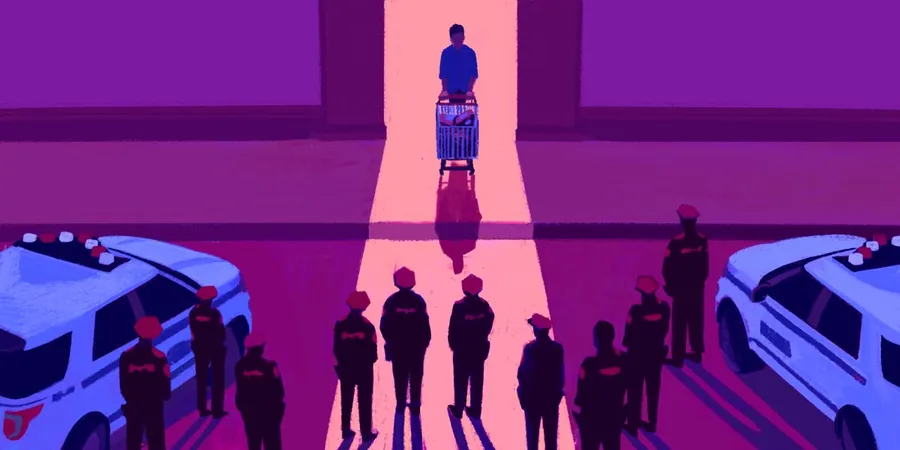
Inside America's 'War on Organized Retail Crime': A Complex Crisis or a Misguided Assault on the Vulnerable?
2024-09-30
Inside America's 'War on Organized Retail Crime': A Complex Crisis or a Misguided Assault on the Vulnerable?
In a striking episode last October, undercover investigators hired by fashion retailers Lululemon and Victoria's Secret infiltrated a modest flea market in San Francisco's Mission District, posing as potential buyers. This market, known as Arriba Juntos—meaning "upward together" in Spanish—primarily features vendors who are mostly immigrants striving to cope with escalating living expenses. A vigilant vendor, suspecting the investigators might not be what they seemed, raised alarms about the presence of uniformed officers. Shortly thereafter, police arrived, resulting in the arrest of two women, Veronica Lumbreras-Villanueva, 40, and her mother-in-law, Deysi Ramirez, 59, who were selling bras priced at $20 each.
Despite their claims of having legally acquired the bras elsewhere, the police seized upon the fact that the garments still bore price tags, suggesting they may have been stolen. With a total cash holding of just $79, the two women faced startling accusations. San Francisco's district attorney claimed their sale constituted a "Mission District fencing operation," a supposedly organized venture promoting "retail theft." Should they be convicted, they risk over three years in prison—yet no concrete evidence tied them to any significant theft rings.
The crackdown on retail theft has accelerated since the COVID-19 pandemic, with major retailers pressing for action against what they label an uptick in "smash and grab" crimes. During Black Friday 2021, reports surfaced of mobs overwhelming stores like Nordstrom and Louis Vuitton, while nationwide concerns about rampant theft prompted retail chains to fortify their items behind protective barriers. However, statistics indicate that many retailers experienced little to no increase in overall inventory loss.
As the retail industry ramped up pressure, lawmakers in nine states responded by increasing penalties for what they categorize as "organized retail crime." Even the federal government became involved, with some policymakers drawing dubious connections between retail theft and more serious crimes such as human trafficking. California, in particular, has become a battleground for this initiative, passing laws defining organized theft and stacking penalties against offenders, including a proposed measure in November that could create a "three strikes" law for shoplifting.
While high-profile cases of alleged organized theft exist, the evidence tying vast criminal networks to everyday shoplifting remains tenuous at best. The arrests of Lumbreras-Villanueva and Ramirez stand as a glaring example of a systemic issue where a desperate struggle for survival can lead to severe legal repercussions. Experts note that many prosecutions stem from individuals in dire circumstances—often those battling homelessness or addiction—not organized crime.
For many in economically disadvantaged positions, petty crimes often emerge not from malice but from necessity. One woman I spoke with, currently serving time for stealing due to economic hardship, remarked, "It’s very hard for me. I steal because I can't read or write." This starkly contrasts with the narrative presented by retailers and government officials, who exploit these incidents as justifications for sweeping policy changes.
Recent data and anecdotes highlight a troubling trend: many of those prosecuted for retail theft are young and impoverished individuals, further complicating the portrayal of organized crime as the primary source of these issues. A homeless group in the Mission District, selling stolen items, sees their actions differently, dismissing the idea that they are part of any organized criminal operation—an assertion echoed by witnesses across the state.
Government responses have often appeared disproportionate, resembling a full-blown war rather than practical solutions to complex societal problems. Amid this turmoil, the conversation about the role of systemic poverty in retail theft remains silenced, as retailers capitalize on public fear to shape narratives beneficial to their bottom lines.
Gavin Newsom's administration has funneled millions into combating organized retail crime, yet parallels can be drawn between this initiative and previous "wars" waged by the government on drugs and terrorism—resulting in broader social ramifications that disproportionately affect the marginalized. For instance, of those charged with organized retail theft in San Francisco, many are minors or individuals merely attempting to survive in a relentless socioeconomic climate.
The overarching narrative portrays retail theft as a significant threat to businesses—a narrative that has provided those businesses with a rationale to further criminalize poverty. As the lives of desperate individuals continue to spiral under the weight of legal repercussions, the call to focus on rehabilitation rather than punishment grows louder.
Despite these developments, concrete figures proving an increase in organized retail crime remain elusive. Critics argue that the estimates provided by corporate retailers, lacking independent verification, drive a sensational narrative that distracts from the root causes of economic disparity.
This intricate web of laws and enforcement underscores an urgent question: Are we addressing the symptoms of a systemic crisis head-on, or merely leveraging fear to impose stricter regulations and punishments on the most vulnerable among us? As the debate rages on, it's clear that the existing policies may be dealing not just with shoplifting but with deeper societal issues that demand empathy and understanding, not criminalization.
The preliminary hearing for Lumbreras-Villanueva and Ramirez is set for October 3, nearly a year after their arrest—a process that raises concerns as to whether justice is being served or if we're simply caught in a relentless punitive cycle. One thing seems evident: this is a war that extracts its toll, not just on retailers but on society at large, as countless lives hang in the balance amidst the chaos of organized retail crime narratives.


 Brasil (PT)
Brasil (PT)
 Canada (EN)
Canada (EN)
 Chile (ES)
Chile (ES)
 España (ES)
España (ES)
 France (FR)
France (FR)
 Hong Kong (EN)
Hong Kong (EN)
 Italia (IT)
Italia (IT)
 日本 (JA)
日本 (JA)
 Magyarország (HU)
Magyarország (HU)
 Norge (NO)
Norge (NO)
 Polska (PL)
Polska (PL)
 Schweiz (DE)
Schweiz (DE)
 Singapore (EN)
Singapore (EN)
 Sverige (SV)
Sverige (SV)
 Suomi (FI)
Suomi (FI)
 Türkiye (TR)
Türkiye (TR)